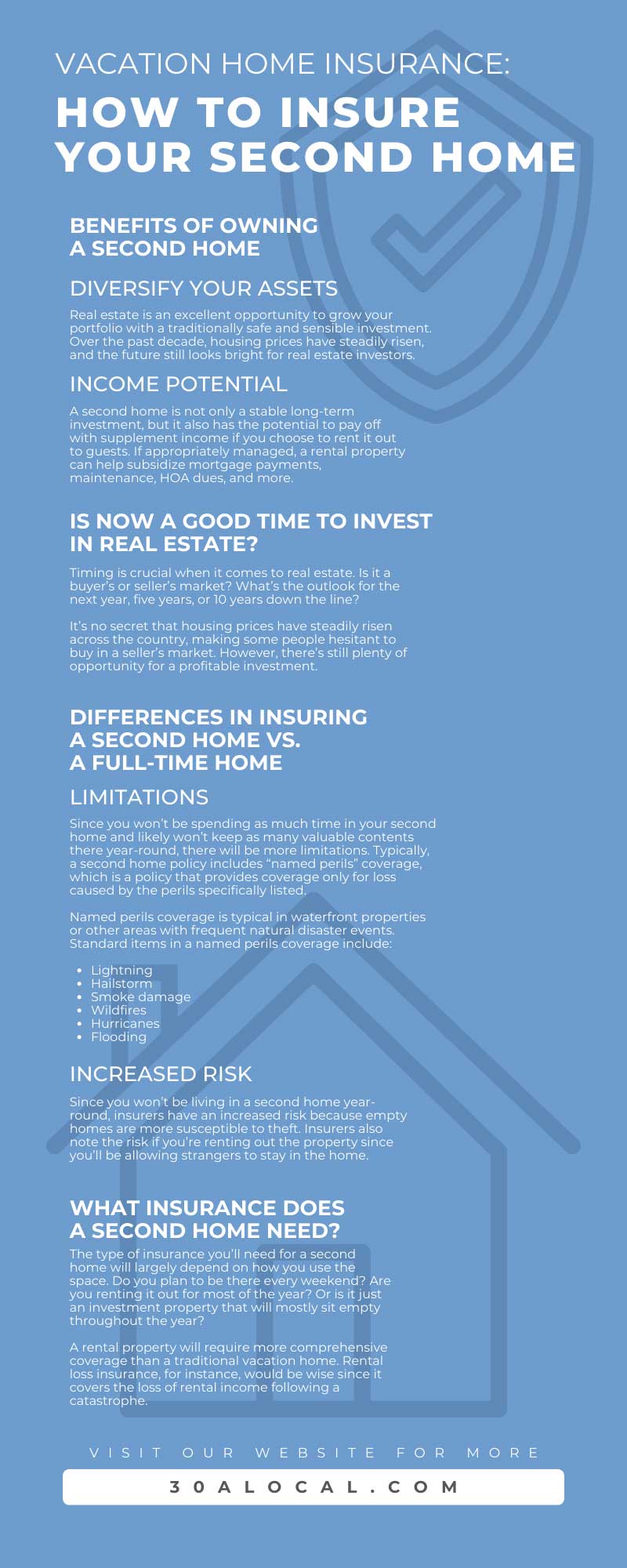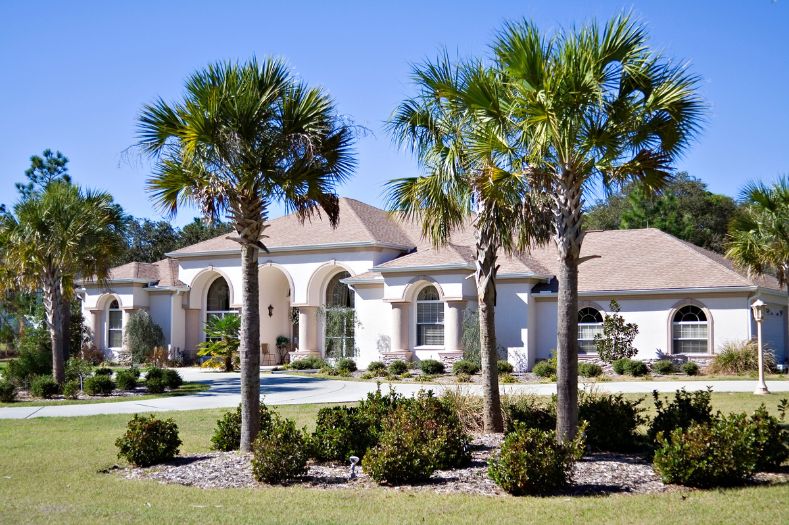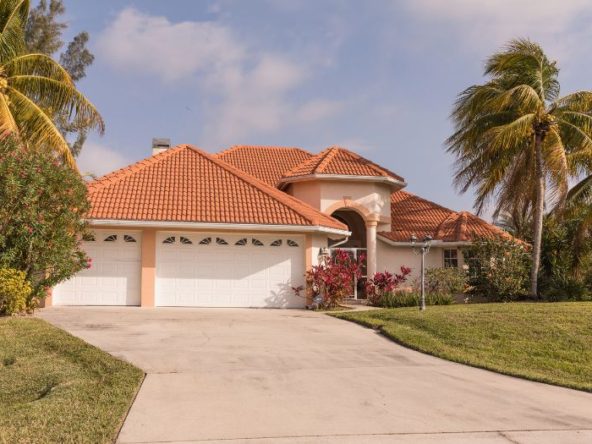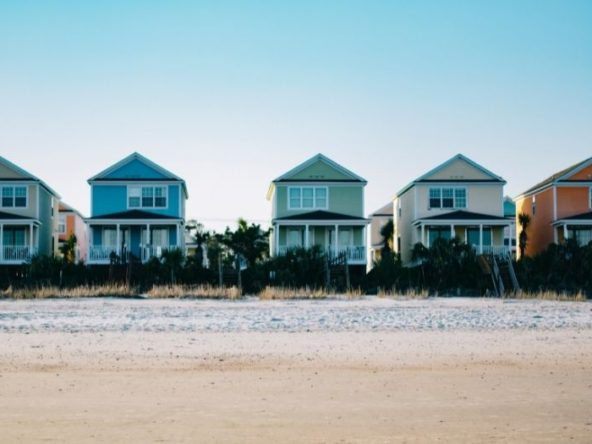A requirement for any vacation home is insurance, but the details can be confusing, so we’ve put together a helpful explainer of how to insure your second home! We’ll go over the benefits of owning a second home, the distinctions in insuring a vacation home, what insurance you’ll need, and more.
Benefits of Owning a Second Home
Before we get into the particulars of second home insurance, what are the benefits of owning a second home in the first place? From financial security to a vacation home, there are plenty of reasons to consider investing in a second home!
Diversify Your Assets
Any financial advisor will tell you that it’s always beneficial to have diverse assets in your portfolio. Spreading your holdings limits your exposure and makes for a more stable range of investments.
Real estate is an excellent opportunity to grow your portfolio with a traditionally safe and sensible investment. Over the past decade, housing prices have steadily risen, and the future still looks bright for real estate investors.
Income Potential
A second home is not only a stable long-term investment, but it also has the potential to pay off with supplement income if you choose to rent it out to guests. If appropriately managed, a rental property can help subsidize mortgage payments, maintenance, HOA dues, and more.
Manage a rental property capably and it could turn a monthly profit for you!
Future Retirement Home
A second home can be more than just an investment or rental property—it can also become the future home of your retirement. Do you know where you want to retire? Why wait? Get in now and use it as a vacation home until you’re ready to hang it up.
It’s easier to qualify for a mortgage while you’re still employed, and with a head start, you could have most, if not all, of your mortgage paid off by retirement!
Vacation Place for the Family
We’ve talked about a second home’s financial and sensible advantages, but it’s also a fun asset to own for you and the family! Does your family love to take vacations and have a favorite spot? Invest in a vacation home, and you’ll have a second home base for holidays and family get-togethers.
A vacation home lets you get even more familiar with the community you may one day retire in and makes vacations easier, logistically speaking!
Is Now a Good Time To Invest in Real Estate?
Timing is crucial when it comes to real estate. Is it a buyer’s or seller’s market? What’s the outlook for the next year, five years, or 10 years down the line?
It’s no secret that housing prices have steadily risen across the country, making some people hesitant to buy in a seller’s market. However, there’s still plenty of opportunity for a profitable investment.
In Florida, for instance, where many people purchase vacation and retirement homes, it’s still a great time for property investment, thanks to a booming economy and low fixed mortgage rates. If you’re interested in a second home, you can’t beat the scenic Gulf views and quaint beach towns of the 30A! Let our agents find you the best piece of 30A Florida real estate that fits your needs and budget.
Differences in Insuring a Second Home vs. a Full-Time Home
Regarding how to insure a second home, there are some differences homeowners should know about covering a permanent residence and a part-time place. Much of the coverage is the same, but the crucial distinctions come in coverage limitations and the increased risk.
Limitations
Since you won’t be spending as much time in your second home and likely won’t keep as many valuable contents there year-round, there will be more limitations. Typically, a second home policy includes “named perils” coverage, which is a policy that provides coverage only for loss caused by the perils specifically listed.
Named perils coverage is typical in waterfront properties or other areas with frequent natural disaster events. Standard items in a named perils coverage include:
- Lightning
- Hailstorm
- Smoke damage
- Wildfires
- Hurricanes
- Flooding
Increased Risk
Since you won’t be living in a second home year-round, insurers have an increased risk because empty homes are more susceptible to theft. Insurers also note the risk if you’re renting out the property since you’ll be allowing strangers to stay in the home.
However, there are ways to mitigate the risk with additions such as an advanced security system and a locked gate when you’re not staying at the property.
What Insurance Does a Second Home Need?
The type of insurance you’ll need for a second home will largely depend on how you use the space. Do you plan to be there every weekend? Are you renting it out for most of the year? Or is it just an investment property that will mostly sit empty throughout the year?
A rental property will require more comprehensive coverage than a traditional vacation home. Rental loss insurance, for instance, would be wise since it covers the loss of rental income following a catastrophe.
Personal liability coverage will also cover you if one of your guests gets injured on the property. But there are many other insurance policies a second home can benefit from.
Dwellings Coverage
Dwellings coverage is straightforward—it protects your second home in the case of fire, weather damage, or theft. If you invest in a state-of-the-art security system, you may be able to negotiate specific parts of the coverage for a more favorable rate.
Other Structures Coverage
If your second home has additional structures, such as a garage, gardening shed, or boat dock, other structures coverage will protect you should they become damaged.
Loss of Use Coverage
Loss of use coverage activates when your second home becomes ruined due to an event, like a fire or natural disaster. If you need to live somewhere else temporarily, loss of use coverage will cover the further living expenses.
Personal Property Coverage
If you plan on keeping any belongings in the second home, a must-have for homeowners is personal property coverage. A personal property policy will cover any personal belongings in the house, from furniture to kitchenware.
Rental Property Insurance
If you plan to rent out your second home and utilize the renter’s income, it’d be wise to invest in rental property insurance, also known as landlord insurance. This policy covers the rental property itself, personal property, and legal or medical bills for any guest or person injured while on the property that you’re found legally responsible for.
Owning a second home and exploring insurance options can be confusing, but we hope our guide has helped clear some things up! If you have any questions about owning a vacation home or rental property in Florida, don’t hesitate to contact the experts at 30A Local Properties!




